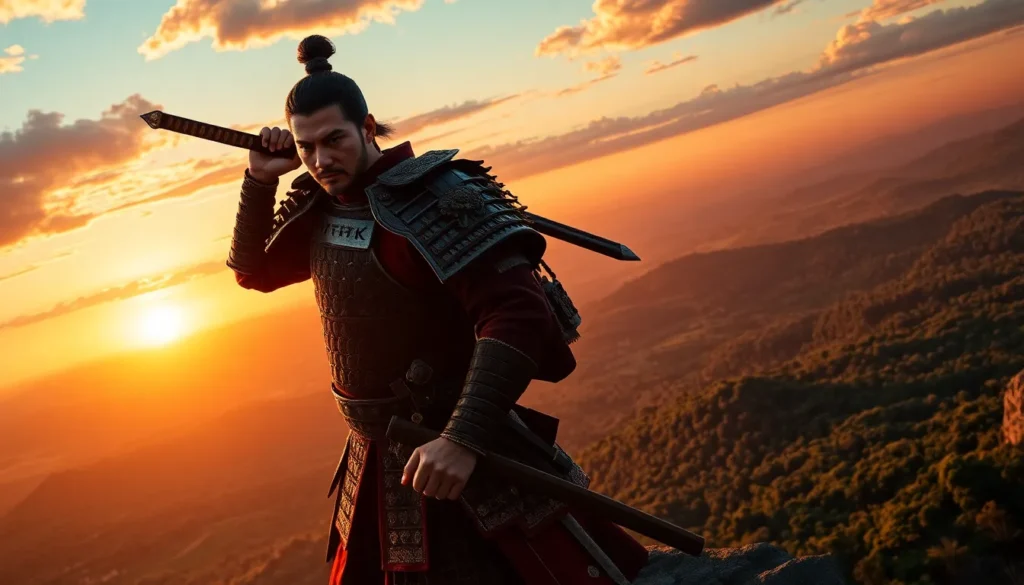Table of Contents
ToggleIn the world of video games, few stories resonate like that of Jin Sakai in Ghost of Tsushima. Imagine slicing through enemies with the grace of a dancer, while wrestling with the weight of honor and moral dilemmas. Sounds captivating, right? This action-packed adventure, steeped in Japanese history and rich emotions, invites players to explore not just the stunning landscapes of Tsushima, but the very essence of what it means to be a samurai. Buckle up as we investigate into Jin’s extraordinary journey, from honorable warrior to the ghostly avenger.
The Story of Jin Sakai

His Journey as a Samurai
Jin Sakai, the protagonist of Ghost of Tsushima, is no ordinary samurai. Raised as the only son of clan Sakai, he embodies the bravery and values of the samurai tradition. From a young age, Jin underwent rigorous training, learning the philosophy of bushido, the way of the warrior. In the wake of the Mongol invasion, he finds himself pitted against formidable odds. The initial stages of his journey are rooted in honor, duty, and loyalty to his uncle, Lord Shimura, the clan leader.
As the story unfolds, Jin’s world is flipped upside down. The invaders don’t just threaten his homeland, they challenge everything he stands for. In a move that would surprise many traditionalists, he begins to embrace unconventional methods to combat his enemies. This leads to a pivotal moment in his life when he must decide whether to uphold the samurai code or adapt to a new, ruthless strategy. His quest for identity becomes more than just a personal journey: it transforms into a struggle for Tsushima itself.
The Transformation into the Ghost
With the destruction of his clan and the loss of those he loves, Jin’s transformation begins. He evolves from a noble warrior into the terrifying Ghost, a figure shrouded in fear rather than honor. This shift is not just circumstantial: it’s deeply rooted in his psychological journey.
Jin learns to wield the shadows to his advantage. He employs stealth tactics previously shunned by samurai, waylaying enemies with stealthy precision. This marks his internal conflict as he battles between his traditional upbringing and his newfound approach to fighting injustice. As the Ghost, he becomes a symbol of hope for the oppressed, challenging the brutality of the Mongol forces while navigating the murky waters of personal ethics. The character arc of Jin Sakai is a powerful exploration of sacrifice, pain, and redemption.
Key Relationships and Influences
The Role of Lord Shimura
No discussion of Jin’s journey would be complete without highlighting Lord Shimura, his uncle and mentor. A steadfast guardian of samurai traditions, Lord Shimura serves as both a father figure and a moral compass for Jin. Their relationship is intricately woven through the fabric of the game, showcasing the challenge of clashing ideologies.
Jin’s transformation into the Ghost brings forth a fundamental conflict with Lord Shimura. While the old lord cherishes the samurai’s code, Jin faces a reality where such principles seem inadequate against the cruelty of the Mongol invasion. Each interaction with Shimura is laden with tension, underscoring the gravity of their differing paths and the burden of loyalty.
The Impact of Yuna
On the other hand, Yuna, a skilled thief with a heart of gold, profoundly influences Jin’s evolution. With her more pragmatic insights into survival, Yuna embodies the challenges facing the people of Tsushima. Her resilience shows Jin that adaptability is key in their battle against oppression.
Together, they forge a partnership that breaks away from conventional samurai expectations, incorporating equality and shared purpose. Jin’s relationship with Yuna highlights the power of cooperation, trust, and mutual respect in the darkest times. It is through Yuna that Jin discovers an alternative way to confront his enemies while embracing the weight of his inevitable legacy.
Themes and Symbolism
Honor vs. Sacrifice
Ghost of Tsushima tackles complex themes, the most prominent being honor versus sacrifice. As Jin grapples with his new identity as the Ghost, he often faces moral dilemmas that challenge his understanding of what it means to be a samurai.
Throughout his journey, he must weigh loyalty against the practicality of survival. The game questions whether true honor lies in strict adherence to outdated codes or in the willingness to adapt for the greater good. This theme resonates deeply with players, as it reflects real-world struggles of sacrifice and morality.
The Spirit of Tsushima
The symbolism of the spirit of Tsushima plays a crucial role in Jin’s story. The island isn’t just a backdrop: it is a character in its own right. The landscapes, from serene forests to haunting battlefields, echo the struggles of its inhabitants and the spirit of resistance.
Jin becomes a vessel for this spirit, representing the resilience of the people against overwhelming odds. As players traverse Tsushima, they feel the weight of the history tied to the land. Each victory for Jin stands as a tribute not only to his progression but also to the enduring spirit of Tsushima and its people.
Gameplay Mechanics Involving Jin
Combat Styles and Skills
One of the standout aspects of Ghost of Tsushima is its combat mechanics, intricately designed around Jin’s evolving skills. Players experience a rich tapestry of combat styles, reflecting Jin’s growth from a traditional samurai to a cunning Ghost.
Jin utilizes various stances to counter different types of enemies, each stance not only raises the stakes but also showcases his adaptation to the evolving battlefield. The flow of combat feels natural, blending fluid movements and strategic planning. This engaging system immerses players in Jin’s transformation, allowing them to experience his internal conflict through the lens of gameplay.
Stealth and Exploration Features
Stealth plays a significant role in Jin’s gameplay. As he embraces the ways of the Ghost, players are rewarded for their cunning and creativity. Utilizing the environments, players can execute silent takedowns or strategize to evade detection.
Exploration further enhances the experience, with lush open-world design urging players to uncover Tsushima’s secrets. Engaging with various quests and environments, players deepen their understanding of Jin’s world, building a connection to his journey that is both impactful and immersive.
The Legacy of Jin Sakai
Cultural Impact and Reception
Jin Sakai’s character has left a significant mark on gaming culture. Ghost of Tsushima is celebrated not only for its engaging gameplay but also for its nuanced storytelling, addressing themes of honor, identity, and the moral complexities of warfare. The game received acclaim for its representation of Japanese culture, skillfully marrying authentic historical elements with a narrative that resonates across cultural boundaries.
Critics praised its visual storytelling, capturing both the beauty and brutality of feudal Japan. From art design to character development, Jin’s journey invites players to explore complex issues while delivering action-packed excitement. The legacy of Jin Sakai transcends the screen, inspiring discussions around the moral choices that define a hero.
Jin’s Place in Gaming History
As a character, Jin Sakai stands among the greats in gaming history. His story is a powerful reminder that heroes can evolve and adapt to the changing tides of battle and morality. Jin’s transformation from samurai to Ghost challenges traditional notions of heroism, emphasizing that greatness often comes from deep turmoil and sacrifice.
As players continue to discover the heartfelt narrative on its own, Jin’s presence lingers, inviting players to reflect on their personal journeys in gaming and life.







